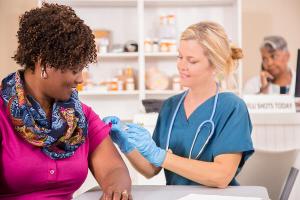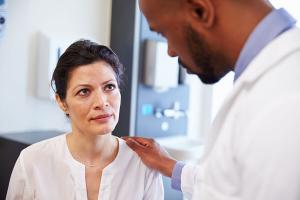The female athlete triad—low energy availability, menstrual dysfunction, and impaired bone health—can impact women and girls in sports. Preventing complications involves balancing energy intake, tracking menstrual cycles, and protecting bone health. Learn key steps to stay active and healthy.
Pregnancy-related high blood pressure can have life-changing impacts on mothers and babies, and that’s why the Office on Women’s Health (OWH) remains committed to improving blood pressure control in women of reproductive age. High blood pressure, or hypertension, is a health concern that...
The U.S. Department of Health and Human Services (HHS) issued a third amendment to the Declaration under the Public Readiness and Emergency Preparedness Act (PREP Act) to increase access to lifesaving childhood vaccines and decrease the risk of vaccine-preventable disease outbreaks as children...
The 20th annual National Women’s Health Week is here! I am thrilled to be part of the celebration this year as the new director of the Office on Women’s Health. As a practicing physician, I have been focused on women and girls’ health issues my entire career and am excited to bring my knowledge to...
The Community Preventive Services Task Force (CPSTF) recently released a recommendation for interventions that aim to prevent or reduce intimate partner violence (dating violence) and sexual violence among youth. This recommendation is based on a systematic review of 28 studies. The findings showed...
If we’ve learned one thing at Her Campus, it’s that college is an important time for personal discovery and navigating the world of sexuality. But with the excitement, it’s crucial to get educated about sexual assault and how we can foster a healthy culture of consent on campus and off. Sexual...
Parents, you can help protect your child from getting certain HPV-related cancers. How? With a safe and effective vaccine! Here are the top five things you should know about HPV, or human papillomavirus, and the vaccine. HPV infection is very common. HPV is the most common sexually transmitted...
Editorial note: Content for the Q&A is from the Centers for Disease Control and Prevention (CDC). Find all of CDC’s information about the flu. Chills. Body aches. Fatigue. These are just a few of the symptoms people often experience when they get influenza, or more commonly called flu. Your best...
At your last doctor’s visit, did anyone ask if you were safe at home? It’s important to know why you are being asked about your intimate relationships and what happens if you say that you are not safe. Approximately 1 in 3 women in the United States report experiencing some form of intimate partner...
Content warning: Sexual assault One in five undergraduate women (PDF - 282 KB) are sexually assaulted during college. When I think about that number, I want to change it so everyone is safe. This National Campus Safety Awareness Month, I encourage you to support the theme "Take the First Step" and...











